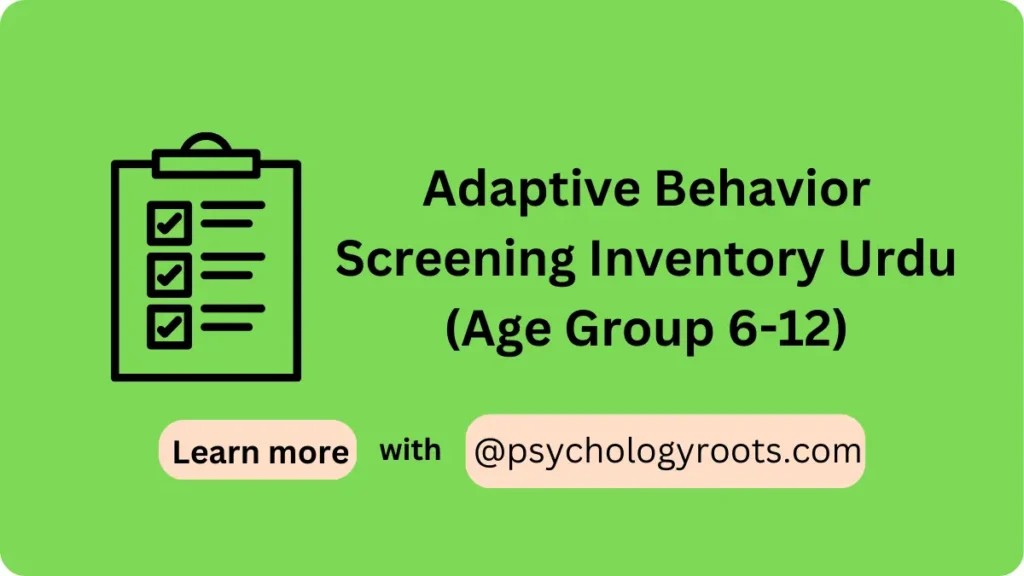Table of Contents
Adaptive Behavior Screening Inventory Urdu
Here in this post, we are sharing the “Adaptive Behavior Screening Inventory Urdu”. You can read psychometric and Author information. We have thousands of Scales and questionnaires in our collection (See Scales and Questionnaires). You can demand us any scale and questionnaires related to psychology through our community, and we will provide you with a short time. Keep visiting Psychology Roots.
About Adaptive Behavior Screening Inventory Urdu
Scale Name
Adaptive Behavior Screening Inventory Urdu (Age Group 6-12)
Author Details
Unknown
Translation Availability
Not Sure

Background/Description
Adaptive behavior refers to a set of conceptual, social, and practical skills that a person develops over time to function effectively in everyday life. These skills allow us to meet the demands of our environment, such as taking care of ourselves, getting along with others, and managing our responsibilities.
Here are some of the different categories of adaptive behavior:
- Conceptual skills: These skills involve things like problem-solving, critical thinking, and understanding abstract concepts like time and money.
- Social skills: These skills involve interacting with others in a positive and appropriate way. This includes things like communication, following rules, and showing empathy.
- Practical skills: These skills involve taking care of oneself and completing everyday tasks. This includes things like dressing, grooming, eating, and using transportation.
The development of adaptive behavior is important for everyone, but it is especially important for children. As children grow and develop, they learn new skills that allow them to become more independent and take on more responsibility.
Adaptive behavior is a complex concept, and there are many factors that can influence its development. These factors include a person’s intellectual ability, their emotional and social development, and their cultural background.
Why is Adaptive Behavior Important?
Adaptive behavior is an important concept for a few reasons. First, it is a different concept than intelligence. Adaptive behaviors are learned behaviors that reflect a person’s ability to function in everyday life. Second, adaptive behavior is a good indicator of a person’s overall well-being. People who have strong adaptive skills are more likely to be successful in school, work, and relationships. Finally, adaptive behavior is an important factor in diagnosing developmental disabilities.
Administration, Scoring and Interpretation
Preparation:
- Ensure you have enough copies of the scale for all participants.
- Decide on the mode of administration (paper-and-pencil, online survey platform, etc.).
- Prepare any additional materials like instructions or demographic questionnaires.
Informed Consent:
- Obtain informed consent from participants, explaining the purpose of the study, how data will be used, and their right to withdraw.
Instructions:
- Clearly explain the scale format (e.g., strongly disagree to strongly agree).
- Provide examples of how to respond.
- Clarify any ambiguities in the scale items.
Responding:
- Allow participants sufficient time to read and respond to each item.
- Ensure privacy for participants while completing the scale.
Addressing Issues:
- Be prepared to answer questions about the scale or the study in a neutral and informative way.
- Address any technical difficulties during online administration.
Collection:
- Collect all completed scales and ensure all participants have responded to all items.
- Organize the completed scales for data entry or analysis.
Reliability and Validity
N/A
Available Versions
116-Items
Reference
N/A
Important Link
Scale File:
Disclaimer
Please note that Psychology Roots does not have the right to grant permission for the use of any psychological scales or assessments listed on its website. To use any scale or assessment, you must obtain permission directly from the author or translator of the tool. Psychology Roots provides information about various tools and their administration procedures, but it is your responsibility to obtain proper permissions before using any scale or assessment. If you need further information about an author’s contact details, please submit a query to the Psychology Roots team.
Help Us Improve This Article
Have you discovered an inaccuracy? We put out great effort to give accurate and scientifically trustworthy information to our readers. Please notify us if you discover any typographical or grammatical errors.
Make a comment. We acknowledge and appreciate your efforts.
If you have any scale or any material related to psychology kindly share it with us at psychologyroots@gmail.com. We help others on behalf of you.